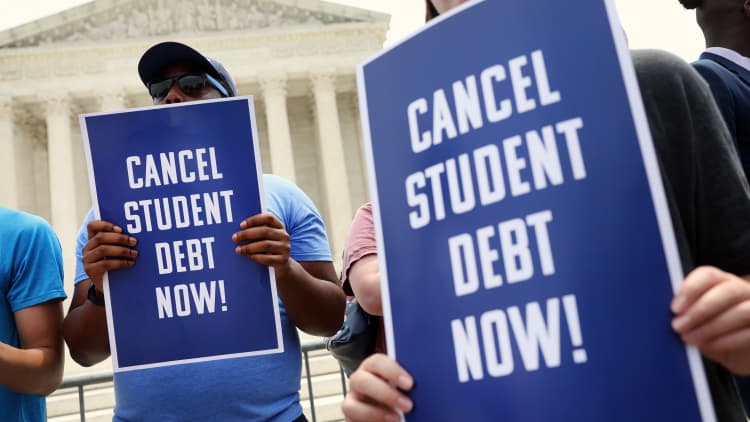Damircudic | E+ | Getty Images
Millions of student loan borrowers were looking forward to a smaller monthly bill come July, until a legal challenge to the Biden administration’s new relief plan got in the way last week.
But on June 30, a federal appeals court green-lighted the U.S. Department of Education to implement a major provision of its new Saving on a Valuable Education, or SAVE, plan.
The bottom line: As promised, most enrolled borrowers should still see their July bills come down.
Here are some answers to other questions borrowers might have.
Why is the SAVE plan being challenged?
President Joe Biden rolled out the SAVE plan in the summer of 2023, describing it as “the most affordable student loan plan ever.” So far, around 8 million borrowers have signed up for the new income-driven repayment plan, according to the White House.
Under IDR plans, borrowers’ monthly payments are set based on a share of their discretionary income. They receive forgiveness after a set period, typically 20 years or 25 years. (SAVE replaced the Education Department’s former REPAYE option, or Revised Pay As You Earn plan.)
More from Personal Finance:
What Taylor Swift’s The Eras Tour says about ‘passion tourism’
‘NEETS’ and ‘new unemployables’: Why fewer young adults are working
What the new IRS guidance on crypto tax reporting means for investors
The SAVE plan has the most generous terms to date, which has led to the current controversy.
Instead of paying 10% of their discretionary income a month toward their undergraduate student debt under REPAYE, borrowers need to pay just 5%.
Those who earn less than roughly $15 an hour have a $0 monthly bill, and borrowers with smaller balances are entitled to loan forgiveness on an expedited timeline — in as little as 10 years.
“The SAVE plan is very generous to borrowers, almost like a grant after the fact,” higher education expert Mark Kantrowitz said in a previous interview with CNBC.
Where do the lawsuits against SAVE stand?
Republican-backed states, including Florida, Arkansas and Missouri, filed lawsuits against the SAVE plan earlier this year.
The states argued that the Biden administration was overstepping its authority with SAVE, and essentially trying to find a roundabout way to forgive student debt after the Supreme Court blocked its sweeping plan last year. In response, two federal judges in Kansas and Missouri temporarily halted significant parts of the SAVE plan last week.
As a result, the Biden administration was prevented from forgiving debt on a faster timeline under the new income-driven repayment plan and from further reducing borrowers’ payments in July, as it planned to.

Those rulings came down days before payments were set to drop. As a result, the U.S. Department of Justice geared up to appeal the injunctions and the Education Department announced it would temporarily pause payments for many SAVE borrowers while the legal proceedings played out.
It has now decided the payments will continue. That’s due to the fact that the Biden administration’s appeal against one of the injunctions, which prevented it from lowering payments, was successful. The case has not been decided yet, but at least for now the Education Department can proceed with reducing borrowers’ bills.
Meanwhile, the second injunction against the SAVE plan regarding expedited loan forgiveness, which came down last week from a federal judge in Missouri, remains in effect.
What does this mean for me?
As a result of its successful appeal, the Biden administration is currently moving ahead with the SAVE plan provision that slashes borrowers’ monthly payments to 5% of their discretionary income. Many people will see their bill cut in half.
If your loan servicer already sent you a bill that reflects your lower payment, you should plan to pay that bill in July, the Education Department said.
If you were placed in a forbearance because your loan servicer is still calculating your new lower payment or anticipated bills would be temporarily paused during the legal drama, you should aim to make your first payment in August. (And that bill should be reduced.)
If a borrower has a $0 monthly bill under SAVE — which some 4.5 million people do — you will continue to owe nothing and be considered up to date on their payments, the department said.